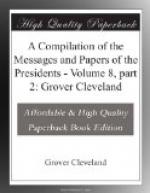The life of our Washington can not suffer by comparison with those of other countries who have been most celebrated and exalted by fame. The attributes and decorations of royalty could have only served to eclipse the majesty of those virtues which made him, from being a modest citizen, a more resplendent luminary.
Misfortune, had he lived, could hereafter have sullied his glory only with those superficial minds who, believing that characters and actions are marked by success alone, rarely deserve to enjoy it. Malice could never blast his honor, and envy made him a singular exception to her universal rule. For himself, he had lived enough to life and to glory. For his fellow-citizens, if their prayers could have been answered, he would have been immortal. For me, his departure is at a most unfortunate moment. Trusting, however, in the wise and righteous dominion of Providence over the passions of men and the results of their councils and actions, as well as over their lives, nothing remains for me but humble resignation.
His example is now complete, and it will teach wisdom and virtue to magistrates, citizens, and men, not only in the present age, but in future generations as long as our history shall be read. If a Trajan found a Pliny, a Marcus Aurelius can never want biographers, eulogists, or historians.
JOHN ADAMS.
The House of Representatives having resolved unanimously to wait on the President of the United States ’"in condolence of this national calamity,” the Speaker, attended by the House, withdrew to the house of the President, when the Speaker addressed the President as follows:
SIR: The House of Representatives, penetrated with a sense of the irreparable loss sustained by the nation in the death of that great and good man, the illustrious and beloved Washington, wait on you, sir, to express their condolence on this melancholy and distressing event.
To which the President replied as follows:
UNITED STATES, December 19, 1799.
Gentlemen of the House of Representatives:
I receive with great respect and affection the condolence of the House of Representatives on the melancholy and affecting event in the death of the most illustrious and beloved personage which this country ever produced. I sympathize with you, with the nation, and with good men through the world in this irreparable loss sustained by us all.
JOHN ADAMS.
UNITED STATES, December 31, 1799.
Gentlemen of the Senate:
I nominate Timothy Pickering, Secretary of State; Oliver Wolcott, Secretary of the Treasury, and Samuel Sitgreaves, esq., of Pennsylvania, to be commissioners to adjust and determine, with commissioners appointed under the legislative authority of the State of Georgia, all interfering claims of the United States and that State to territories situate west of the river Chatahouchee, north of the thirty-first degree of north latitude, and south of the cession made to the United States by South Carolina; and also to receive any proposals for the relinquishment or cession of the whole or any part of the other territory claimed by the State of Georgia, and out of the ordinary jurisdiction thereof, according to the law of the United States of the 7th of April, 1798.




